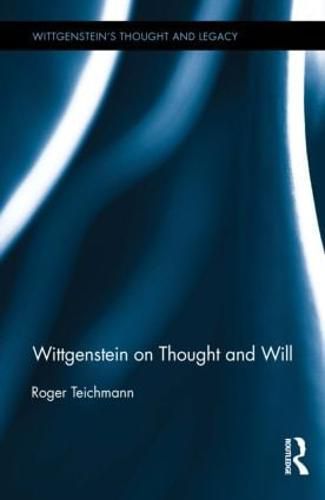Readings Newsletter
Become a Readings Member to make your shopping experience even easier.
Sign in or sign up for free!
You’re not far away from qualifying for FREE standard shipping within Australia
You’ve qualified for FREE standard shipping within Australia
The cart is loading…






This book examines in detail Ludwig Wittgenstein’s ideas on thought, thinking, will and intention, as those ideas developed over his lifetime. It also puts his ideas into context by a comparison both with preceding thinkers and with subsequent ones. The first chapter gives an account of the historical and philosophical background, discussing such thinkers as Plato, Descartes, Berkeley, Frege and Russell. The final chapter looks at the legacy of, and reactions to, Wittgenstein. These two chapters frame the central three chapters, devoted to Wittgenstein’s ideas on thought and will. Chapter 2 discusses the sense in which both thought and will represent, or are about, reality; Chapter 3 considers Wittgenstein’s critique of the picture of an inner process, and the role that behaviour and context play in his views on thought and will; while Chapter 4 centres on the question What sort of thing is it that thinks or wills?, in particular examining Wittgenstein’s ideas concerning the first person (I) and concerning statements like I am thinking or I intend to do X.
$9.00 standard shipping within Australia
FREE standard shipping within Australia for orders over $100.00
Express & International shipping calculated at checkout
This book examines in detail Ludwig Wittgenstein’s ideas on thought, thinking, will and intention, as those ideas developed over his lifetime. It also puts his ideas into context by a comparison both with preceding thinkers and with subsequent ones. The first chapter gives an account of the historical and philosophical background, discussing such thinkers as Plato, Descartes, Berkeley, Frege and Russell. The final chapter looks at the legacy of, and reactions to, Wittgenstein. These two chapters frame the central three chapters, devoted to Wittgenstein’s ideas on thought and will. Chapter 2 discusses the sense in which both thought and will represent, or are about, reality; Chapter 3 considers Wittgenstein’s critique of the picture of an inner process, and the role that behaviour and context play in his views on thought and will; while Chapter 4 centres on the question What sort of thing is it that thinks or wills?, in particular examining Wittgenstein’s ideas concerning the first person (I) and concerning statements like I am thinking or I intend to do X.